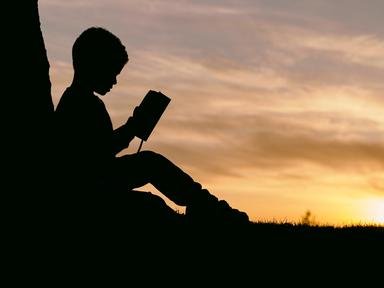Quiz Answer Key and Fun Facts
1. "When I was down beside the sea
A wooden spade they gave to me
To dig the sandy shore."
What do you think this poem is called, based on the first verse?
2. "The friendly ___ all red and white,
I love with all my heart:
She gives me cream with all her might,
To eat with apple-tart."
Which animal, that we get milk from, is mentioned in this verse?
3. "Of speckled eggs the birdie sings
And nests among the trees;
The sailor sings of ropes and things
In ships upon the seas.
The children sing in far Japan,
The children sing in Spain;
The organ with the organ man
Is ______ in the rain."
What is the missing word from this poem?
4. "All the names I know from nurse:
Gardener's garters, Shepherd's purse,
Bachelor's buttons, Lady's smock,
And the Lady Hollyhock."
These are all strange sounding names but they can be seen in the garden with different shapes, colours and smells. What do you think this poem is called?
5. "From breakfast on through all the day
At home among my friends I stay,
But every night I go abroad
Afar into the land of Nod."
Where will you be if you visit the land of Nod?
6. "Whenever Auntie moves around,
Her dresses make a curious sound,
They trail behind her up the floor,
And trundle after through the door."
What do you think this poem is called?
7. "My tea is nearly ready and the sun has left the sky.
It's time to take the window to see Leerie going by;
For every night at teatime and before you take your seat,
With lantern and with ladder he comes posting up the street."
This poem is called "The Lamplighter". What type of energy did street lamps use in the 19th century?
8. "Faster than fairies, faster than witches,
Bridges and houses, hedges and ditches;
And charging along like troops in a battle
All through the meadows the horses and cattle:
All of the sights of the hill and the plain
Fly as thick as driving rain;
And ever again, in the wink of an eye,
Painted stations whistle by."
Can you guess what type of transport is used in this poem?
9. "Late lies the wintry sun a-bed,
A frosty, fiery sleepy-head;
Blinks but an hour or two; and then,
A blood-red orange, sets again."
Which season of the year do you think is mentioned in this verse?
10. "I woke before the morning, I was happy all the day,
I never said an ugly word, but smiled and stuck to play.
And now at last the sun is going down behind the wood,
And I am very happy, for I know that I've been ______."
What word do you think completes this rhyming verse?
Source: Author
Plodd
This quiz was reviewed by FunTrivia editor
looney_tunes before going online.
Any errors found in FunTrivia content are routinely corrected through our feedback system.

